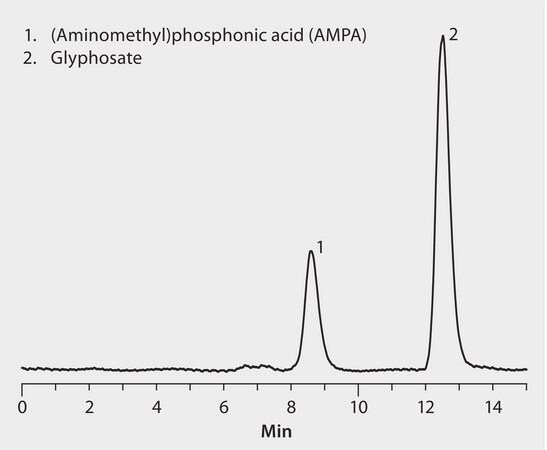EPA Method 547: HPLC Analysis of Glyphosate and Glyphosate Degradation Product (Aminomethyl)phosphonic Acid (AMPA) on SUPELCOSIL™ SAX1

Materials
Analytical column
Standard
Phthaldialdehyde
suitable for HPLC fluorimetric detection of amino acids, ≥99% (HPLC), powder or crystalsmobile phase component
CONDITIONS
column
SUPELCOSIL SAX1, 25 cm x 4.6 mm I.D., 5 μm particles (59138)
mobile phase
[A] 5 mM monobasic potassium phosphate (pH 1.9 with phosphoric acid); [B] methanol; (A:B, 96:4)
flow rate
0.5 mL/min
column temp.
38 °C
detector
fluorescence, excitation 338 nm, emission 455 nm
detector
post column conditions for the oxidation solution (see EPA Method 547): flow rate 0.2 mL/min, temperature 38 °C, reactor volume 500 μL; (post column conditions for the derivatization solution (see EPA Method 547): flow rate 0.5 mL/min, ambient temperature, mixing device 500 μL mixing loop (0.5 mm))
injection
100 μL
sample
100 ng/mL in water
Description
Analysis Note
EPA Method 547 outlines the analysis of glyphosate in drinking water by direct aqueous injection HPLC, post column derivatization, and fluorescence detection. Anion exchange columns can be used for this method and have been shown to produce excellent results. A system is described here using a silica-based anion-exchange HPLC column (SUPELCOSIL SAX1) instead of a polymer-based column. Advantages of the silica-based column include compatibility with organic solvents and higher pressure stability. These, in turn, lead to increased column lifetime.
Legal Information
SUPELCOSIL is a trademark of Sigma-Aldrich Co. LLC